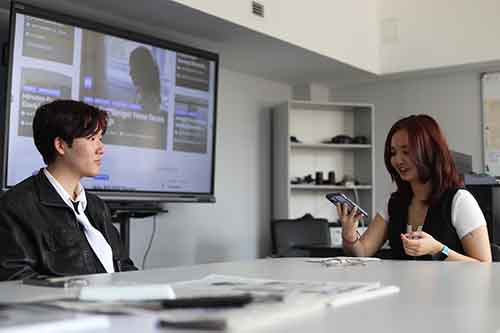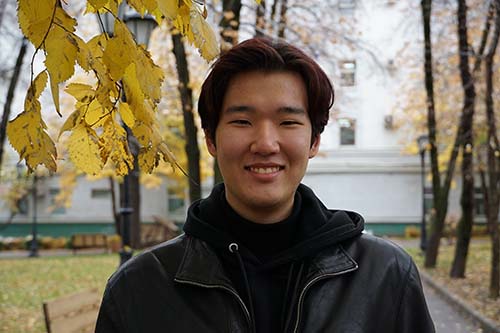Amangeldi-Azat Maratuly, first year KIMEP student majoring in law, recently won a debate tournament and secured a grant at KIMEP University, an achievement that has intensified his passion for law, debate, and youth advocacy. The 18-year-old freshman from Almaty shares his insight into balancing a demanding academic and extracurricular schedule, his commitment to human rights, and the experiences that have shaped his career ambitions. Known for his involvement in various youth organizations and activism initiatives, Maratuly’s journey reflects a young person’s drive to make a difference while pursuing personal growth. Maratuly is also known for his TikTok account @welcomeazat with almost twelve thousand followers. He expresses his thoughts and opinions while chilling in his bedroom and gets fifty thousand views on average.

Q: How did you find out about this debate grant, and what inspired you to participate?
A: I actually found out by complete accident. My school has always been supportive of students applying for various grants. We even have a unique approach to encouraging students to try for them, whether it’s a debate grant or another competition. They tell us “Just go for it, apply wherever possible, and it’ll reflect positively on the school.”
A friend of mine, who is really into debating and has way more experience than I do, suggested I try for the KIMEP debate tournament. She said “Azat, your English is great – why not give it a shot?” At first, I wasn’t even thinking about winning. I thought I’d just get a few nice photos, maybe post on Instagram, and enjoy some good snacks. I was genuinely surprised by the result – it wasn’t my goal to win, but it turned out really well. I’d say it was more about the experience, but that experience led to something great.
Q: So, you mainly came to KIMEP for the experience and didn’t anticipate actually winning?
A: Exactly. I already had some good memories at KIMEP from other events, like the Flex final round and a few other projects, so I thought it’d be nice to visit again. The environment at KIMEP has always felt supportive and welcoming, so I didn’t have any specific goals other than just taking part and seeing what would happen. Winning just happened to be an amazing outcome.
Q: Did you prepare specifically for this debate, or was it more of a last-minute decision?
A: I did prepare, but honestly, I only started two days before the tournament. We were given two resolutions – a month in advance, which was pretty early. They covered technical space issues and artificial intelligence. My debate partner and I thought it was unusual to get so much time to prepare, and we assumed everyone would study intensively. But, as it turned out, most teams, including ours, prepared just a few days before. For me, my English skills and experience with public speaking were helpful. Even though I wasn’t as practiced in debate techniques as some other competitors, I think my oratory and communication skills pulled me through.
Q: What drew you to study law, especially considering your interest in debate and human rights?
A: It all started during the quarantine. I was in eighth or ninth grade and had a lot of time to reflect and develop new interests while staying at home. I got active on social media and began posting about important issues like anti-bullying, violence, and other social causes. This experience opened my eyes to social issues that really affect young people, and I decided I wanted to make a difference.
I also wanted to build my CV, so I got involved in volunteer organizations. I joined Teenergizer, which focuses on HIV/AIDS awareness, and then moved to Y-PEER, which advocates for sex education and reproductive health rights in Kazakhstan. My involvement in these organizations sparked my passion for human rights and advocacy, and I realized that studying law would allow me to deepen my understanding and work on these issues in a professional capacity.
Q: Would you say that your extracurricular activities influenced your career choice?
A: Absolutely. My volunteer work with Teenergizer and Y-PEER was the beginning. Being around passionate, knowledgeable activists and being part of projects that really impacted people made me want to pursue law and specialize in human rights. These experiences shaped my path and taught me the value of working toward a larger goal. By the time I was in high school, I was already convinced that human rights and advocacy were the areas I wanted to focus on.
Q: Balancing all of this sounds challenging. How did you manage it as a student?
A: I learned to use my time wisely, partly because I had a lot of free time after school. Classes usually ended around one in the afternoon, so I had the whole day to volunteer and work on projects. My parents were supportive, which made it easier, and I quickly learned to be independent. Now that I’m in university, I’m still involved in similar projects. I’m currently working as a project manager at a public fund called ITeachMe, which focuses on helping people with disabilities. This role feels like a natural extension of my volunteer work, and it’s great to be able to apply my skills in a meaningful way.
Q: You’re also active on TikTok. How did that begin?
A: It was totally spontaneous. I once posted a video sharing some thoughts on school, and it unexpectedly got a lot of views. People really connected with what I had to say, so I decided to keep posting similar videos. Now, TikTok is like a kind of video diary for me, where I can share my thoughts and opinions. It’s also a way to de-stress and unwind. I don’t see myself as a TikToker in the traditional sense – it’s more of a passion project that lets me express myself.
Q: With such a busy schedule, how do you stay motivated without burning out?
A: A few things really help. First, I prioritize getting enough sleep. It sounds simple, but it makes a huge difference. Another big help is surrounding myself with a supportive community, where we all encourage each other. Limiting my social media use has also improved my focus and mental health. I find that when I’m not constantly scrolling or checking notifications, I can stay more grounded and avoid overthinking.
Q: What are your impressions of KIMEP so far?
A: I love the community. Everyone’s very welcoming and supportive. The first few weeks were full of activities, which was a lot of fun, and I quickly felt at home. For now, I’m focusing on my courses, but I’m open to seeing where my studies take me. KIMEP’s environment has been inspiring and motivating for me.
Q: Do you have any advice for current high school students, especially 10th and 11th graders?A: Don’t be afraid to show your personality. High school is a great time to explore your interests and get involved in different activities. I know it can feel intimidating, but putting yourself out there and engaging in various projects will make you stand out. Also, don’t neglect your studies – having a strong academic foundation is essential. You don’t have to have everything figured out yet, but it’s important to stay active and make the most of your time.

